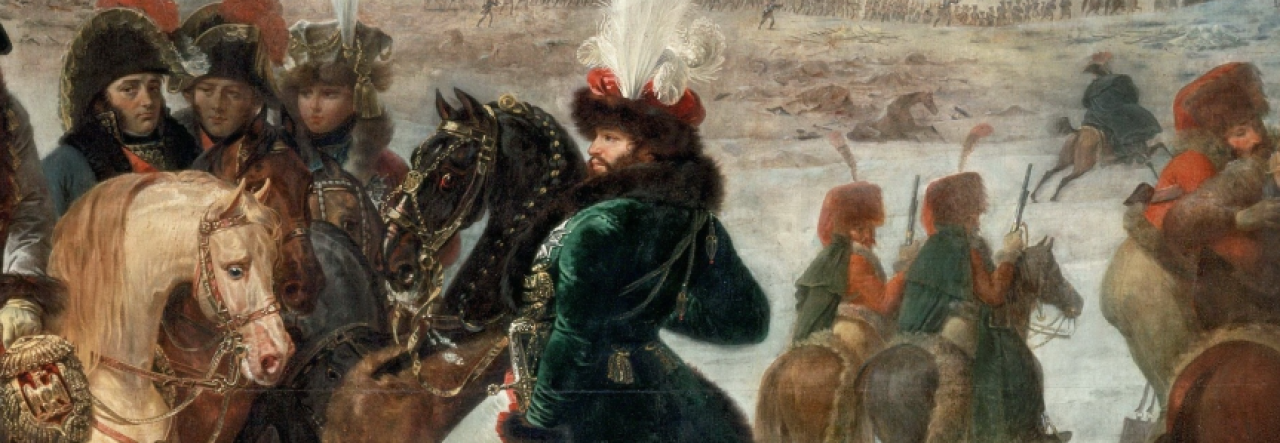
A continuation of my translation of excerpts from Louise Murat’s Souvenirs d’enfance d’une fille de Joachim Murat, the first installment of which can be found here. In this excerpt, from pages 18-21, Louise gives her children (to whom the Souvenirs are written as a series of letters) a detailed description of Joachim and Caroline Murat.
***
My father, very great of height and very strong, had the male beauty which so well suited a soldier; his confident stride, his tan complexion, his strongly accentuated features, his hair black as jet, could have given hardness to his physiognomy, if blue eyes of an extreme sweetness and a charming smile hadn’t revealed the tenderness and kindness which were hidden under this soldierly appearance.
Born in the lowest ranks of the people, he had had over many of his comrades in arms and in fortune this advantage of being destined by his parents (poor farmers of the Lot) for the ecclesiastical state and placed by them in the seminary, he had profited from the few years of instruction that he had received, was very educated (for a soldier of this time), wrote very well in prose and made even some pretty verses.
I’ve often heard it recounted by the family that, if he had been noticed among so many brave men for his brilliant valor, so also must he have been for his facility for writing, for his sure and rapid glance in the military reconnaissances with which he was charged, for the clarity of the reports that he made to the General-in-Chief during the first wars of Italy, to be distinguished by him and attached to his person… And whereas several of the most valiant warriors of the Republic, arrived at the summit of honors, sometimes made the new court blush by the vulgarity of their language, of their manners, and by their ignorance, my Father, called to the highest ranks, as much by his personal merit as by his marriage to Caroline, youngest sister of Napoleon, knew better how to understand his new position and to show himself there with propriety and dignity.
Caroline was only sixteen years old when she fell in love with the brilliant general Murat. Very thin, very delicate, she was far away then from being the woman who, several years later, would be cited by all Europe for her beauty. The Emperor had said in speaking of her: “She was the laideron [ugly girl] of the family, but she has since repealed that!” I remember having seen in the cabinet of the King, in Naples, her portrait at the time of her marriage; she was represented with hair scattered upon her shoulders… One would have said it was the portrait of a child of twelve years! We contemplated it often and always with astonishment at not being able to find there a single one of the features of our Mother.
Rather small than large, a little plump, of a dazzling whiteness to give the impression, at her toilette in the evening, that her bare shoulders were covered with white satin, my Mother did not have this regularity of features, this purity of lines which distinguished her older sister Pauline, with whom she is so often compared. The latter was a Greek statue in all her perfection; but my Mother, although much less perfect, with her natural grace, her amiability, and her elegance, pleased as much and perhaps even more than she.
Almond-shaped eyes, a velvety glance (and I have often heard it said a thousand times to explain the sweetness of this look), feet and hands of a smallness and a rare perfection were the most beautiful things about her.
For the most sought-after elegance, she loved the toilette, and to occupy herself with it, but with a sort of cavalier attitude that I may never have encountered in any other pretty woman! She lost only the essential time, and was always ready at the fixed hour, probably remembering that punctuality is the politeness of royalty.
Such were, my children, your grandfather and your grandmother, at the most distant time that I’ve remembered. I believe to have traced you a very exact physical portrait, and as for the moral one, it is by giving you some details on their private life, it is by searching to destroy the calumnies of which they are the object, it is by discussing, by explaining their conduct and their feelings, all while admitting the faults they may have had, that I hope, little by little, in the course of these letters, to be able to give you about them some more just and precise ideas than all those that you could draw from the books of our time, written for the most part with a marked malevolence.

Pingback: Caroline Bonaparte Murat, Napoleon’s Treasonous Sister | Shannon Selin